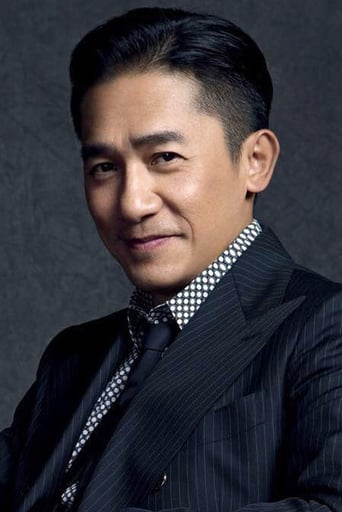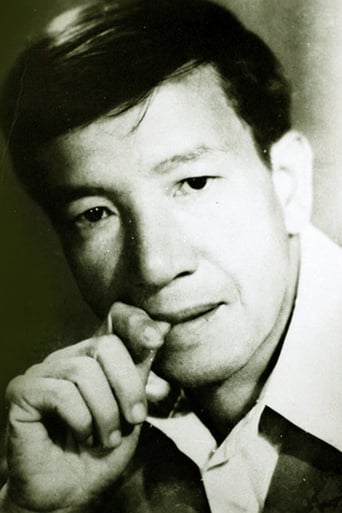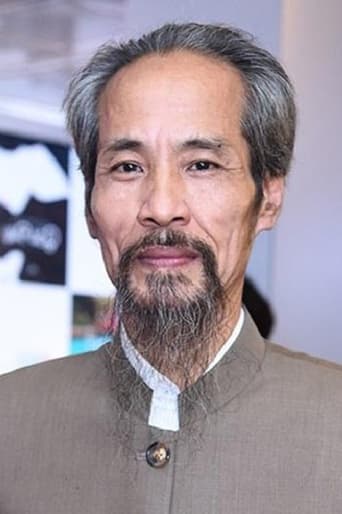Diagonaldi
Very well executed
Glucedee
It's hard to see any effort in the film. There's no comedy to speak of, no real drama and, worst of all.
Ortiz
Excellent and certainly provocative... If nothing else, the film is a real conversation starter.
Joseph Sylvers
"Cyclo" begins with neo-realist naturalism, as a young man struggles day to day driving his cycle taxi in modern day Vietnam. His father has just died, and after working his entire life as a bike-taxi driver, has nothing to leave his children, but the suggestion that they might find something nobler to do with their lives. The young man spends his days navigating the alleys and the side streets for the quickest routes and attempting to avoid collisions with other bike taxi drivers who have divided the city into turfs and gangs, of who can pick up customers where.One day his taxi is stolen, and to repay the taxi's owner (a local lady crime boss); he has to take on a series of petty crimes to pay the debt. The young man is never given a name; the credits refer to him as "Cyclo", his sister as "sister" etc. His sister(played by the gorgeous Tran Nu Yen-Khe begins a tenuous relationship with the boss of the gang Youth works for, a silent constantly smoking man called "Poet" played by the always excellent Tony Leung. By relationship I mean he pimps her out to old business men provided they "not touch her", instead she indulges their foot and urine fetishes, in at first disturbing and then increasingly reflective and resigned scenes. The Poet rarely speaks but we hear his poetry for time to time in voice over, obliquely appearing and disappearing. The first half of the film focuses more on Cyclo getting in over his head with the gang, stealing, transporting drugs,and lighting a rival building on fire with a Molotov cocktail.The second half shows us more of the "Poet" and "the Sister". Dialog is sparse throughout, but the sister seems to only really exist in relation to the poet, he pimps her out, but not too much. That may be going too far, as we do get a "sense" that her indulging the fetishists is more amusing and certainly less physically tiring than the work she was doing before. Leung's apartment becomes a kind of club house for the girls, a paradoxical bordello of innocence. The Poet is corrupt but wants to keep some aspects of his life pure. There are scenes where he is beaten by his father and collapses into sudden helpless boyhood, and a virtuoso and pivotal scene in a nightclub set to Radiohead's "Creep", in the best tradition of using pop songs to encapsulate not just moment in time (the 90's in which the film is set), but the very heart of a character. When Yorke sings "what the hell am I doing here?" it might as well be Leong singing it aloud.As Cyclo becomes more fascinated with the power, attention, and adrenalin rush he is getting from the gang, "Poet" becomes more aloof splitting his time between the three girls he pimps, and he the lady crime boss who he serves as soldier and lover(or whore depending on how you look at it). Vietnamese/French director Ahn Hung Tran delicately weaves us in and out of violence and tranquil beauty, near psychedelic explosions of color and poetic reflections, pimps and corpses and children happily at play.After he commits his first major crime, we see him covered in filth, as he had to escape the police in a river or tunnel. The escape isn't fully shown, and we are left with the image of the crime and then the criminal covered in what looks like s*&t; insects crawling slowly across his lips in a close up. To clean his face he puts it in a fish bowl (his only company in the dilapidated room the Poet forces him to live in.), and effectively contaminates the world of the only friend he had. It's a great visual metaphor for gang violence and corruption and its effect on community life, it just makes everything dirtier and sh*&$ier.By the end of the film, Cyclo does not come to his senses, but implodes on himself, and get's a brief offer to escape the life he bumbled or was forced into (its implied that one of the Lady crime bosses henchman was involved in stealing Cyclo's taxi in the first place.) The crime queen's handicapped son, who is Youth's same age, is a kind of mirror image of him throughout the film; financially privileged to his economic struggle, an eternal child to his forced growing-up, the apple of his mother's eye to the deafening absence of being an orphan. Cyclo's blue neon painted face at the end is less about psychedelic freak out as it is a desperate desire to escape back to the simplicities of childhood. The fates of the Poet, Youth, and the crime mistresses' son each reach their peak, at the same moment, showing us the product of innocence/idiocy and evil/apathy. In psychological terms this is guilty and reflective super-ego (poetic Leung) and impulsive childish Id (overgrown man-child son) on two opposite poles of self-destruction, and Ego sandwiched between the two, clinging to a faint possibility of hope/rationality."Cyclo" is compulsively watchable and despite its experimentations easily accessible. The films score reminded me of a Hitchcock film, and is responsible in large to the films strange atmosphere, as if a horror film lurks just beneath the surface at all times, waiting to escape. In a sense the ominous sound-scape is fitting, as there is a horror waiting to devour the characters, and it is their lives. "Cyclo's" cinematic and aesthetic techniques amount to nothing less than incredibly solid and visually breathtaking storytelling, that elevates it's well-worn concept a step above the rest.
badidosh
Perhaps to emphasize the fact that these are people who would easily blend into the city's gritty atmosphere and would therefore be eventually inconspicuous, the characters of Cyclo, Tran Anh Hung's foray into Saigon's seedy underworld, have no name. Merely referred to as the cyclo driver, the poet, the sister, the madam, etc., these characters are merely the paint director and writer Tran uses to create the bigger picture, rather than the pictures themselves.As such, to linearly follow the story's plot is to somehow miss the point since the film is more interested in weaving various story lines to create a brooding picture of Saigon and its impoverished inhabitants. Set in 1995 in the busy commercial capital of Vietnam, a young man (the cyclo driver, played by Le Van Loc) is barely making ends meet pedaling passengers around the city via a pedicab (or a cyclo) all day. But when his cyclo is stolen, the cyclo driver turns to the poet (Hong Kong actor Tony Leung) who takes him under his wings, involving him initially in petty crimes and then gradually to major crimes such as murder and illegal drug trafficking. Meanwhile, the cyclo driver's sister (Tran Nu Yên-Khê) works as a prostitute for the poet, with whom she shares (or shared) a relationship with.More like a visual poetry, the narrative aspect of the film may not appeal to more conventional members of the audience but Tran's masterful creation of a graphic portrayal of the city evokes a visually stunning sense of desperation and decay. The depressing portrait of a city is shared by those who live in it, amplified by the depressing atmosphere that permeates on screen. The end result doesn't necessarily make one feel good; but in this case, that doesn't necessarily mean bad.
soniaandree
The movie was screened two years ago, on my recommendation, and mainly to a UK and some foreigners' audience. Reception and comments about the movie were not as expected: "rubbish!" was heard from an old member, "great!" by some other. There is no in-between when it comes to this movie, most UK people have found it too realistic, most foreign ones saw it as a clear depiction of Ho Chi Minh City's decadence and corruption. In my opinion, this movie has got the merit of showing how things are, and how characters are not so clear-cut in their badness or goodness. It feels like everyone is looking for a form of forgiveness by trying to redeem themselves of past/current actions. In the end, I recommend the movie regardless, though British viewers may find some scenes upsetting. It is not often that the viewer can find such a mix of feelings in a movie's characters. A movie which should not leave you indifferent, that's for sure.
Meganeguard
Around five years ago or so a friend and I were channel surfing until we came across a film in which several pigs were tied up by their hind legs and soon had their throats slit. Wondering what we had come across we checked the local listings and soon learned that the film was a Vietnamese film and that it was titled Cyclo. Not wanting to ruin the film by starting to watch it at the midpoint, we decided that we would later rent it. Well, we never did, so the name Cyclo and the scene in which the pigs have their throats slit remained deeply seeded in my brain. I've finally watched the film and I must say that it was a truly visceral experience.The film opens with the grandfather of three telling of the hardships of his family especially that of his grandson. In order to makes ends meet the grandson, only known as "the cyclo" peddles people around on his bicycle/taxi. To aid their brother, the elder sister delivers water and the younger polishes shoes. The grandfather also pitches in by repairing tires. If this poverty-level existence was not bad enough, the grandson also owes 200, 000 dongs to a mafia Madame.Things go from bad to worse when the cyclo is stolen and the grandson is imprisoned in a nearby apartment by the Madame's man, played by Tony Leung, who is simply known as the Poet. A quiet man who is prone to nosebleeds, the Poet orders the grandson to carry out the Madame's orders, including lobbing Molotov cocktails and smuggling drugs in pork carcasses.Unbeknownst to the grandson, the poet has connections with the young man's older sister. Although a virgin, the beautiful girl, played by the enchanting Tran Nu Yên-Khê, becomes a prostitute. However, she does not become an average prostitute. Instead of becoming a common prostitute, she instead fills the fantasies of fetishists, including those who enjoy watching women urinate. The Poet guards the Sister making sure she remains a virgin and affection grows between the couple. Therefore on one end the Poet is making the grandson murder while on the other he makes the sister embody the fantasies of perverts.Cyclo has to be one of the most violent films that I have ever seen. While there are not many scenes of violence, scenes such as the torture scene with the terrifying Mr. Lullaby are truly horrific. The grandson's self-destructiveness is also quite difficult to watch. Also the depictions of poverty are also quite eye opening and the gap between the haves and the have-nots is quite immense. However, these scenes are also quite beautiful. One can literally feel the humidity of Vietnam, smell the rotting starfruit, and experience the frustration and hopelessness of the grandson when his cyclo is stolen.While I cannot recommend this film to everyone, I do recommend it to those who are interested in Asian film and especially those who have yet to watch films outside of East Asia.






